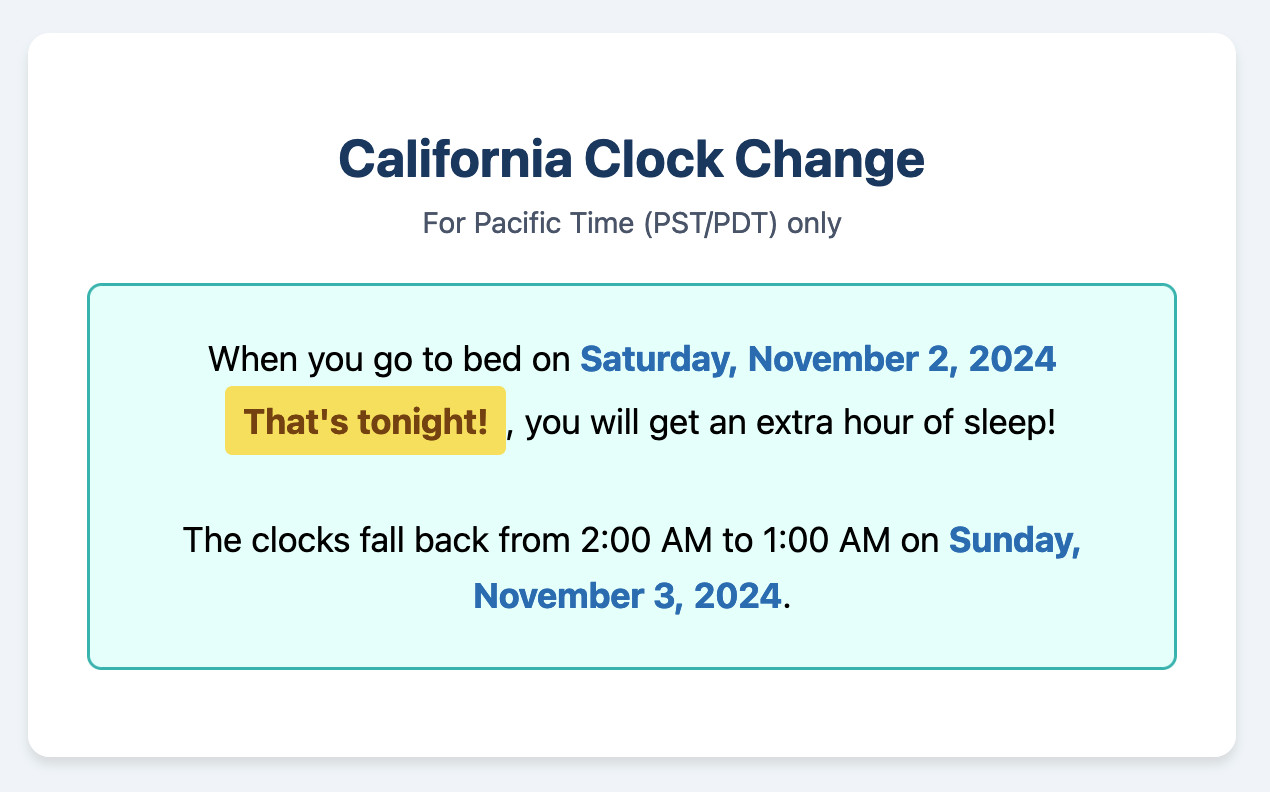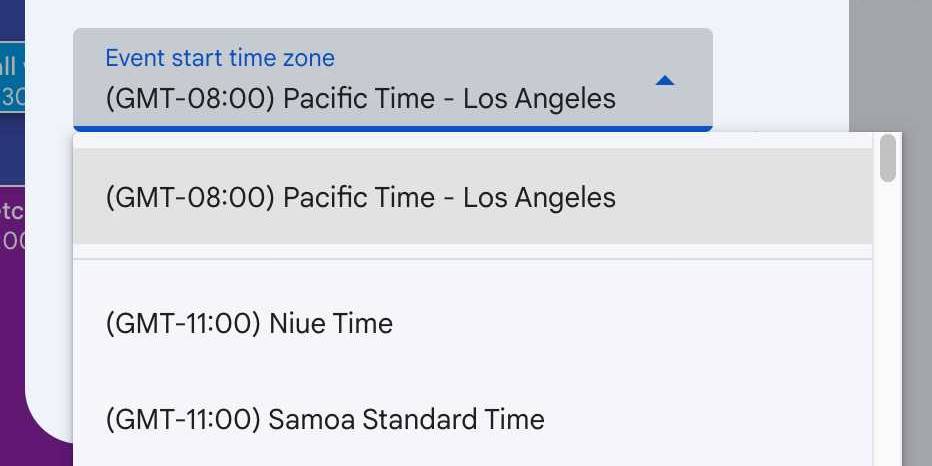15 posts tagged “timezones”
2024
Storing times for human events
I’ve worked on various event websites in the past, and one of the unintuitively difficult problems that inevitably comes up is the best way to store the time that an event is happening. Based on that past experience, here’s my current recommendation.
[... 1,676 words]California Clock Change. The clocks go back in California tonight and I finally built my dream application for helping me remember if I get an hour extra of sleep or not, using a Claude Artifact. Here's the transcript.

This is one of my favorite examples yet of the kind of tiny low stakes utilities I'm building with Claude Artifacts because the friction involved in churning out a working application has dropped almost to zero.
(I added another feature: it now includes a note of what time my Dog thinks it is if the clocks have recently changed.)
Australia/Lord_Howe is the weirdest timezone (via) Lord Howe Island - part of Australia, population 382 - is unique in that the island's standard time zone is UTC+10:30 but is UTC+11 when daylight saving time applies. It's the only time zone where DST represents a 30 minute offset.
sqlite-jiff
(via)
I linked to the brand new Jiff datetime library yesterday. Alex Garcia has already used it for an experimental SQLite extension providing a timezone-aware jiff_duration() function - a useful new capability since SQLite's built in date functions don't handle timezones at all.
select jiff_duration(
'2024-11-02T01:59:59[America/Los_Angeles]',
'2024-11-02T02:00:01[America/New_York]',
'minutes'
) as result; -- returns 179.966
The implementation is 65 lines of Rust.
Jiff (via) Andrew Gallant (aka BurntSushi) implemented regex for Rust and built the fabulous ripgrep, so it's worth paying attention to their new projects.
Jiff is a brand new datetime library for Rust which focuses on "providing high level datetime primitives that are difficult to misuse and have reasonable performance". The API design is heavily inspired by the Temporal proposal for JavaScript.
The core type provided by Jiff is Zoned, best imagine as a 96-bit integer nanosecond time since the Unix each combined with a geographic region timezone and a civil/local calendar date and clock time.
The documentation is comprehensive and a fascinating read if you're interested in API design and timezones.
2023
It’s Time For A Change: datetime.utcnow() Is Now Deprecated (via) Miguel Grinberg explains the deprecation of datetime.utcnow() and utcfromtimestamp() in Python 3.12, since they return naive datetime objects which cause all sorts of follow-on problems.
The replacement idiom is datetime.datetime.now(datetime.timezone.utc)
2022
Benjamin “Zags” Zagorsky: Handling Timezones in Python. The talks from PyCon US have started appearing on YouTube. I found this one really useful for shoring up my Python timezone knowledge: It reminds that if your code calls datetime.now(), datetime.utcnow() or date.today(), you have timezone bugs—you’ve been working with ambiguous representations of instances in time that could span a 26 hour interval from UTC-12 to UTC+14. date.today() represents a 24 hour period and hence is prone to timezone surprises as well. My code has a lot of timezone bugs!
2021
Temporal: getting started with JavaScript’s new date time API. Axel Rauschmayer explores the new proposed API for handling dates, times and timezones in JavaScript., which is under development by Ecma TC39 at the moment (and made available as a Polyfill which you are recommended not to run in production since the API is still being figured out). This is a notoriously difficult problem so it’s always interesting to see the latest thinking on how to best address it.
2018
Big tech warns of ’Japan’s millennium bug’ ahead of Akihito’s abdication (via) Emperor Akihito’s abdication in April 2019 triggers a new era, and the Japanese calendar counts years from the coronation of the current emperor. The era hasn’t changed since 1989 and a great deal of software is unable to handle a change. To make things more complicated... the name of the new era will be announced in late February, but it needs to be represented in unicode as a single new character... and the next version of Unicode (v12) is due out in early March. There may have to be a Unicode 12.1 released shortly afterwards that includes the new codepoint.
2017
Building a location to time zone API with SpatiaLite, OpenStreetMap and Datasette
Given a latitude and longitude, how can we tell what time zone that point lies within? Here’s how I built a simple JSON API to answer that question, using a combination of data from OpenStreetMap, the SpatiaLite extension for SQLite and my Datasette API tool.
[... 2,185 words]2008
django-timezones. Models, form fields and a template filter for dealing with timezones in Django.
What’s New in Edge Rails: Easier Timezones (via) Time zones can be a nightmare to get right—if this works well it’s going to make a lot of people’s lives a whole bunch easier.
2007
calendar.timegm() (via) An “unrelated but handy function” that converts a time.gmtime() in to a corresponding Unix timestamp. I’ve been hand-rolling this one for years; never thought to look in calendar.
Django vs feedparser on dates. Some useful tips in the comments. I find Python’s timezone stuff endlessly frustrating: I know it can do what I want, but it always takes me a ridiculously long time to figure out the necessary incantations.
A Zoned Defense. Using JavaScript’s date.getTimezoneOffset() to detect the user’s timezone and stash it in a cookie.
